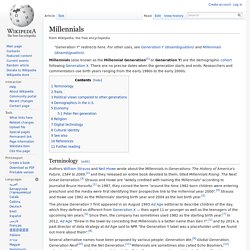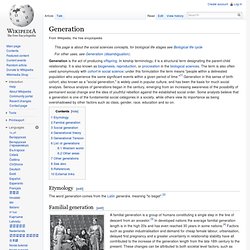

Skate: Converse China “Far East Up North” Baz Luhrmann - Everybody's Free (To Wear Sunscreen) Lyrics. Why Are American Kids So Spoiled? In 2004, Carolina Izquierdo, an anthropologist at the University of California, Los Angeles, spent several months with the Matsigenka, a tribe of about twelve thousand people who live in the Peruvian Amazon.

The Matsigenka hunt for monkeys and parrots, grow yucca and bananas, and build houses that they roof with the leaves of a particular kind of palm tree, known as a kapashi. At one point, Izquierdo decided to accompany a local family on a leaf-gathering expedition down the Urubamba River. A member of another family, Yanira, asked if she could come along. Izquierdo and the others spent five days on the river. Although Yanira had no clear role in the group, she quickly found ways to make herself useful. While Izquierdo was doing field work among the Matsigenka, she was also involved in an anthropological study closer to home. Izquierdo and Ochs shared an interest in many ethnographic issues, including child rearing.
“Can you untie it?” More by Elizabeth Kolbert: Eight Products the Facebook Generation Will Not Buy. Consumer tastes are changing at a greater rate than ever before.

Not surprisingly, the purchasing habits of the youngest generation present the most dramatic shifts — a reflection of what they find important. 24/7 Wall St. has identified eight popular products that the “Facebook generation” is not buying. Generation Y, generally defined as those born between 1980 and 1999, have lost interest in many of the services and products their parents found important.
For example, younger Americans are less interested in cars. In 1998, 64.4% of potential drivers 19-years old and younger had drivers licenses. By 2008, that rate had dropped to 46.3%, according to the Federal Highway Administration. This story was originally published by 24/7 Wall St. What young adults care about has shifted. However, many products that have declined in popularity among the youth are more a result of the changing tastes across all ages than a generational shift. 1. 2.
Millennials: The Greatest Generation or the Most Narcissistic? - Jean Twenge - National. Popular books have argued that today's 20-somethings are more service-oriented than any generation since World War II.

But new research suggests the opposite. Supri Suharjoto/Shutterstock Reading about today's young generation is enough to give you whiplash. The Entrepreneurial Generation - NYTimes.com. To Draw Reluctant Young Buyers, G.M. Turns to MTV. Generation Y. Terminology[edit] Authors William Strauss and Neil Howe wrote about the Millennials in Generations: The History of America's Future, 1584 to 2069,[2] and they released an entire book devoted to them, titled Millennials Rising: The Next Great Generation.[3] Strauss and Howe are "widely credited with naming the Millennials" according to journalist Bruce Horovitz.[1] In 1987, they coined the term "around the time 1982-born children were entering preschool and the media were first identifying their prospective link to the millennial year 2000".[4] Strauss and Howe use 1982 as the Millennials' starting birth year and 2004 as the last birth year.[5] Newsweek used the term Generation 9/11 to refer to young people who were between the ages of 10 and 20 years on 11 September 2001.

The first reference to "Generation 9/11" was made in the cover story of the November 12, 2001 issue of Newsweek.[17] Generation. Generation is the act of producing offspring.

In kinship terminology, it is a structural term designating the parent-child relationship. It is also known as biogenesis, reproduction, or procreation in the biological sciences. The term is also often used synonymously with cohort in social science; under this formulation the term means "people within a delineated population who experience the same significant events within a given period of time. "[1] Generation in this sense of birth cohort, also known as a "social generation," is widely used in popular culture, and has been the basis for much social analysis.
Etymology[edit] The word generation comes from the Latin generāre, meaning "to beget".[2] Familial generation[edit] Five generations of one family—a child with her mother, grandmother, her great-grandmother and great-great-grandmother. Demographics / Population Trends.